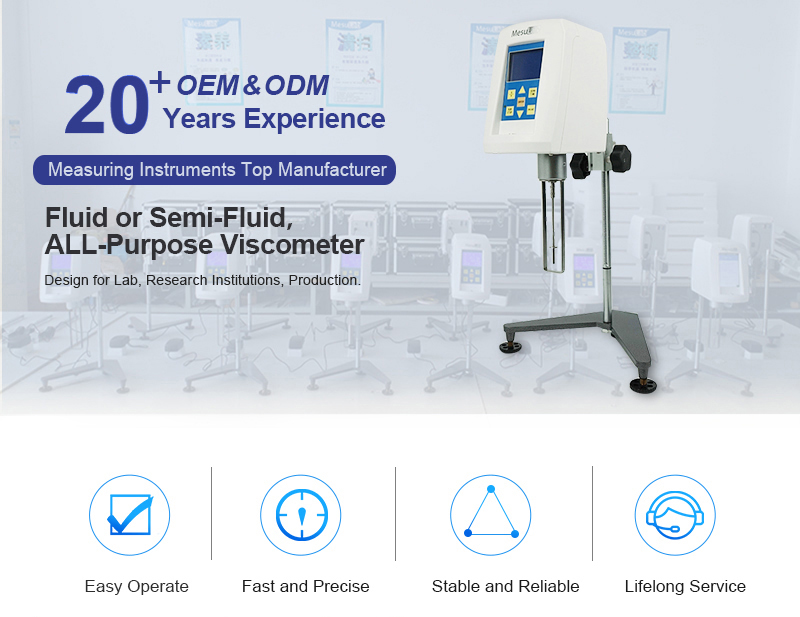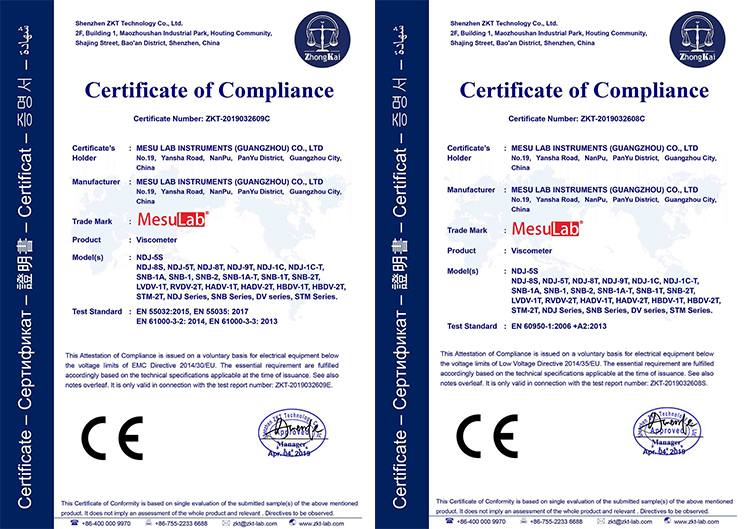Rotational viscometer is a tool to measure the fluidity of materials.
Rotating viscometer is an instrument widely used in scientific research and industrial production to measure the viscosity of liquid or semi-solid substances. It plays a key role in many fields, such as chemistry, food and beverage, pharmacy, coatings and plastics. This paper will introduce the principle, application and its importance in research and production.
The working principle of rotary viscometer is based on Newton's law and rheological principle. It measures the viscosity of the substance by placing it in a container and passing a rotating measuring head through it. The rotating measuring head usually consists of a rotating shaft and a rotating disk attached to it. When the rotating measuring head rotates in the material, the viscosity of the material will hinder the rotating movement, which will make the rotating measuring head suffer certain resistance. According to the applied torque and rotation speed, the viscosity of the substance can be calculated.
It is widely used in scientific research. In the field of chemistry, it is used to measure the viscosity of solutions, thus helping to understand intermolecular interactions and solvent effects. In the food and beverage industry, it is used to determine the viscosity of jam, syrup, paste and so on, so as to optimize the texture and fluidity of products. In the pharmaceutical field, it is used to evaluate the fluidity and stability of drugs and ensure that products meet relevant standards. In addition, it is also widely used in coatings and plastics industries to control the processing flow and final performance of products.
In industrial production, rotational viscometer plays a vital role. By monitoring the change of material viscosity, we can detect the abnormal situation in the production process, such as the existence of pollutants, the change of material composition or equipment failure. This kind of real-time monitoring is helpful to improve production efficiency, reduce rejection rate and ensure the consistency of product quality. It is also used to develop new products, optimize formulas, and conduct quality control and quality assurance tests.
Besides its application value, it also has other advantages. It is easy to operate and can provide accurate and reliable results in a short time. The viscosity data of materials under different conditions can be obtained by different rotating speeds and measuring temperatures. This is very important for studying rheological properties, understanding material behavior and improving products.
In a word, rotary viscometer is an important tool to measure the viscosity of liquid or semi-solid substances. It plays a key role in scientific research and industrial production, helping us to understand the flowing properties of materials and optimize the texture of products.Rotating viscometer is an instrument widely used in scientific research and industrial production to measure the viscosity of liquid or semi-solid substances. It plays a key role in many fields, such as chemistry, food and beverage, pharmacy, coatings and plastics. This paper will introduce the principle, application and its importance in research and production.
The working principle of rotary viscometer is based on Newton's law and rheological principle. It measures the viscosity of the substance by placing it in a container and passing a rotating measuring head through it. The rotating measuring head usually consists of a rotating shaft and a rotating disk attached to it. When the rotating measuring head rotates in the material, the viscosity of the material will hinder the rotating movement, which will make the rotating measuring head suffer certain resistance. According to the applied torque and rotation speed, the viscosity of the substance can be calculated.
It is widely used in scientific research. In the field of chemistry, it is used to measure the viscosity of solutions, thus helping to understand intermolecular interactions and solvent effects. In the food and beverage industry, it is used to determine the viscosity of jam, syrup, paste and so on, so as to optimize the texture and fluidity of products. In the pharmaceutical field, it is used to evaluate the fluidity and stability of drugs and ensure that products meet relevant standards. In addition, it is also widely used in coatings and plastics industries to control the processing flow and final performance of products.
In industrial production, rotational viscometer plays a vital role. By monitoring the change of material viscosity, we can detect the abnormal situation in the production process, such as the existence of pollutants, the change of material composition or equipment failure. This kind of real-time monitoring is helpful to improve production efficiency, reduce rejection rate and ensure the consistency of product quality. It is also used to develop new products, optimize formulas, and conduct quality control and quality assurance tests.
Besides its application value, it also has other advantages. It is easy to operate and can provide accurate and reliable results in a short time. The viscosity data of materials under different conditions can be obtained by different rotating speeds and measuring temperatures. This is very important for studying rheological properties, understanding material behavior and improving products.
In a word, rotary viscometer is an important tool to measure the viscosity of liquid or semi-solid substances. It plays a key role in scientific research and industrial production, helping us to understand the flowing properties of materials and optimize the texture of products.


